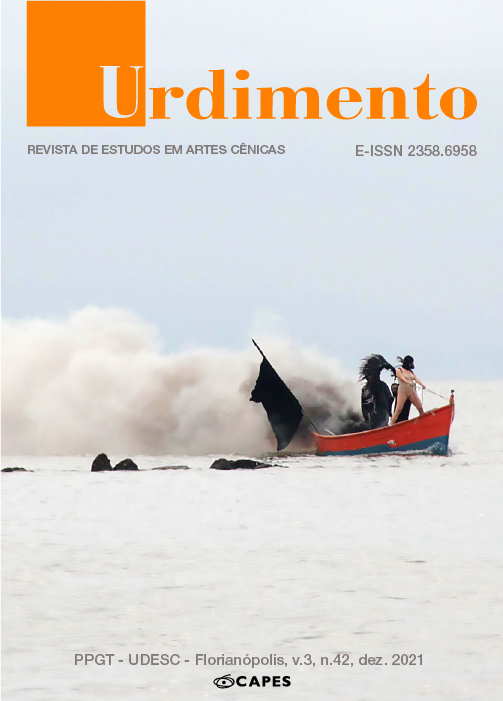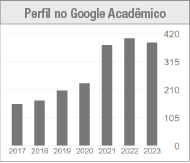The cultivation of dramatic arts: Based on kierkegaardian existential philosophy
DOI:
https://doi.org/10.5965/1414573103422021e0206Keywords:
Existential philosophy, Theatre pedagogy, Dramatic arts, Primitivity, Søren KierkegaardAbstract
This article analyses the way in which Danish philosopher Søren Kierkegaard’s (1813-1855) reflections on the relationship between communication and existence can function as the conceptual foundation for developing a consideration on the cultivation of dramatic arts. Opposing objective communicative forms to those of subjectivity, Kierkegaard makes use of the concept of primitivity as a means of indicating a way of being in which individuals are faced with the phenomenon of their own existence. This article employs theoretical-practical reflections within theatre pedagogy as proposed by Stanislávksi, Knebel and Ward in order to point to the way in which this Kierkegaardian approach allows one to understand the cultivation of the dramatic arts under an existential-communicative light.
Downloads
References
BERTHOLD, Margot. História Mundial do Teatro. São Paulo: Perspectiva, 2001.
HADOT, Pierre. O que é a filosofia antiga? Tradução de Dion Davi Macedo. São Paulo: Edições Loyola, 2004.
KIERKEGAARD, Søren. Søren Kierkegaards Skrifter. 28 vol. Ed. Niels-Jørgen Cappelørn et al. Copenhagen: Gad, 1997–2013.
KNEBEL, Maria. Análise-Ação: práticas das ideias teatrais de Stanislávski. Organização, adaptação e notas de Anatoli Vassíliev. Tradução e notas adicionais de Marina Tenório e Diego Moschkovitch. São Paulo: Ed. 34, 2016.
KOUDELA, Ingrid Dormien; ALMEIDA JR, José Simões. Léxico da Pedagogia do Teatro. São Paulo: Ed. Perspectiva: SP Escola de Teatro, 2015.
KOUDELA, Ingrid Dormien. Jogos Teatrais. São Paulo: Perspectiva, 1998.
LAZZARETTI, L. P. A crise e uma crise na vida de uma atriz, de Søren Kierkegaard. Cadernos de Literatura em Tradução, [S. l.], n. 22, p. 251-289, 2020. DOI: 10.11606/issn.2359-5388.i22p251-289. Acesso em: 27 jul. 2021.
LÜBCKE, Poul. Kierkegaard and Indirect Communication. In.: History of European Ideas. Vol. 12. No. 1, p.31-40, 1990.
MARTINS, Pedro Haddad. Pedagogia em performance: uma abordagem do ensino do teatro na escola básica. 2017. Tese (Doutorado em Pedagogia do Teatro) - Escola de Comunicações e Artes, Universidade de São Paulo, São Paulo, 2017. Acesso em: 11 nov. 2020.
MOREIRA, Virginia. Da máscara à pessoa: a concepção trágica de homem. Revista de Ciências Sociais, Fortaleza, v. 25, p. 21-31, 1994.
PAVIS, Patrice. Dicionário de Teatro. São Paulo: Perspectiva, 1999.
ROSELFELD, Anatol. O Teatro Épico. São Paulo: Perspectiva, 2000.
MARIA THAIS. Cadernos de Registro Macu (Pesquisas), caderno 08, p. 16-17, s.d.
Acesso disponível pelo link:
https://www.macunaima.com.br/cadernos/caderno_08/caderno_08_dossie02.pdf
STANISLAVSKI, Konstantín. El trabajo del actor sobre sí mismo en el proceso creador de la vivencia. Trad. Jorge Saura. 3ª ed. Barcelona: Alba, 2010.
SÖDERQUIST, K. Brian. The Isolated Self. Irony as Truth and Untruth in Søren Kierkegaard´s On the Concepto f Irony. Copenhagen: SKC; C.A. Reitzel, Ltd, 2007.
WARD, Winifred. Creative Dramatics. New York: D. Appleton and Company, 1930.
WARD, Winifred. Theatre for Children. Anchorage, Kentucky: The Childre´s Theatre Press, 1950.
WARD, Winifred. Playmaking with Children (from Kindergarten through Junior High School). New York: Appleton-Century-Crofts, Inc., 1957.
WARD, Winifred. Stories to Dramatize. New Orleans: Anchorage Press, 1981.
VASCONCELLOS, Paulo Sérgio de. Persona poética e autor empírico na poesia amorosa romana. São Paulo: Editora Unifesp, 2016.
VOVOLIS, Thanos. Prosopon. The acoustical mask in Greek Tragedy and in Contemporary Theatre. Estocolmo: Dramatiska institutet, 2009.
Downloads
Published
How to Cite
Issue
Section
License
Copyright (c) 2021 Urdimento - Revista de Estudos em Artes Cênicas

This work is licensed under a Creative Commons Attribution 4.0 International License.
Copyright Statement
The articles published by the magazine are free to use. The copyright is all assigned to the magazine. The articles whose authors are identified represent the expression from the point of view of their authors and not the official position of the journal Urdimento. The author (s) undertakes whenever publishing material relating to the article published in Revista Urdimento mention the said publication as follows: This article was originally published by Urdimento magazine in its volume (put the volume), number (put the number) in the year of (put the year) and can be accessed at:
http://www.revistas.udesc.br/index.php/urdimento
This work is licensed under a Creative Commons Attribution 4.0 International License.




